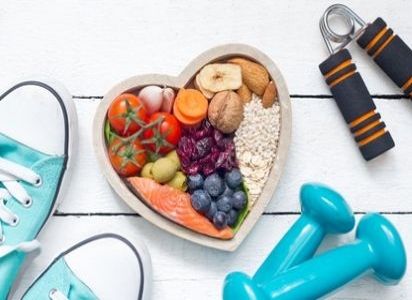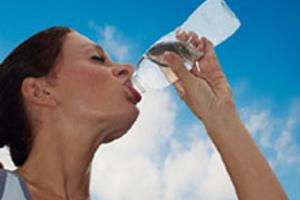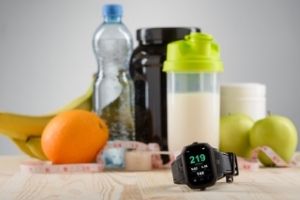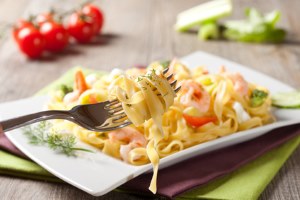- Food #1: rice, satiating and gluten-free
- Food #2: Oatmeal, ideal for your breakfast
- Food #3: eggs, an essential ingredient at any time of the day
- Food #4: chicken, almost at every meal
- Food #5: fish and its virtues
- Food #6: green vegetables, essential for your health
- Food #7: bananas to boost your performance
- Food #8: almonds, ideal as a snack
- Food #9: raisins, to take everywhere
- Food #10: dark chocolate to indulge yourself without (too much) feeling guilty
Food #1: rice, satiating and gluten-free
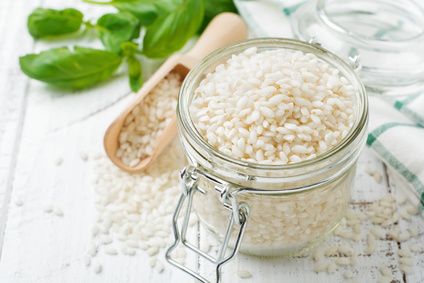
Rice and pasta are essential foods for sportsmen and women. However, rice has the particularity of being gluten-free, a useful aspect for intolerants. In addition, its glycemic index (GI) is moderate (58) if basmati or even low (50) rice is consumed for brown rice. Nevertheless, to be useful to the athlete, avoid as much as possible quick-cooking rice, which has a GI of around 87.
What interests us in rice is its satiety power. With 25 g of carbohydrates per serving, it is one of the sportsman's favourite foods. The reason is simple: carbohydrates instantly boost our performance. It is one of the main fuels used during physical effort.
Before training or competition, carbohydrate intake allows you to leave with a "full tank", i.e. you have enough energy to give your best. During the effort, the carbohydrates (by a hydric supply) avoid the blow of slack and restart the machine. After the session, carbohydrates, like rice, allow you to start a quality recovery.
| Calories | Protein | Glucids | Lipids | Interest |
|---|---|---|---|---|
| 118 kcal | 3.5 g | 25 g | 0.4 g | Rich in fibres Rich in antioxidants Vitamin B source Selenium source |
Read also:
- Athlete's diet: what carbohydrates to eat when playing sports?
- Fast sugars, slow sugars: a wrong concept
Food #2: Oatmeal, ideal for your breakfast
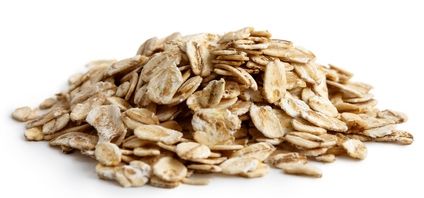
Today, we know that not all cereals are equal. For breakfast, you can choose a large bowl of oatmeal combined with a vegetable drink to improve your health. A recent study (1) published by Harvard University in 2016 looked at the eating habits of more than 786,000 adults. They demonstrated that consuming 70 g of whole grains such as oatmeal would reduce the risk of premature death by 22%. This is because these cereals help to prevent certain cancers and cardiovascular diseases, which represent the 1 era cause of death worldwide. Eating your bowl of oatmeal as soon as you wake up is therefore a useful gesture for your health and sporting performance.
Oatmeal is appreciated for the amount of carbohydrate provided (60 g per 100 g). Ideally, consume them cold to keep a moderate GI. Oatmeal can be eaten as is with a drink or incorporated into simple recipes such as homemade porridge, bowlcake or cereal bars.
| Calories | Protein | Glucids | Lipids | Interest |
|---|---|---|---|---|
| 375 kcal | 11 g | 60 g | 8 g | IG moderate (59) Reduces blood cholesterol level Reduces insulin secretion Aid in transit |
Food #3: eggs, an essential ingredient at any time of the day
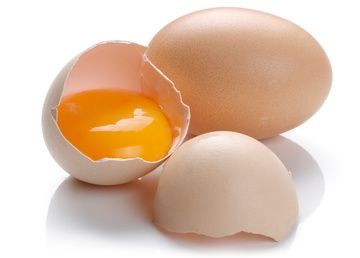
Egg is one of the favourite foods of athletes. Wrongly accused of being responsible for raising the level of "bad" cholesterol, it can be easily consumed at any time of the day and in 1001 different ways. It is worth remembering that LDL cholesterol or "bad" cholesterol is often the result of excessive body manufacture, encouraged by a diet that is too rich in saturated fatty acids.
What interests us in eggs to boost our performance is in particular the rate of proteins with high biological value. In concrete terms, the egg has excellent assimilation and use by the body. It is therefore not necessary to hesitate to consume it. Don't make the mistake of throwing away the egg yolk. Eat it whole to get the most out of the minerals contained. Finally, we strongly encourage you to opt for an ORGANIC egg or, if not, raised outdoors.
| Calories | Protein | Glucids | Lipids | Interest |
|---|---|---|---|---|
| 75 kcal | 6.4 g | 0.4 g | 5.4 g | Antioxidant Proteins with high biological value Choline rich Bon for the brain>ease to prepare |
Food #4: chicken, almost at every meal
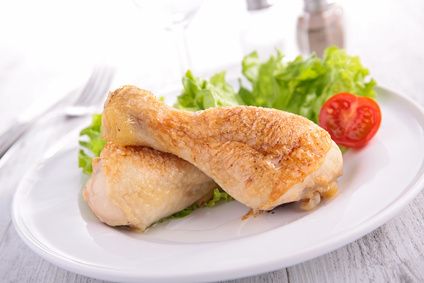
Sports performance requires a high-performance muscle. However, white meat, like chicken, promotes muscle development, maintains our muscles and participates in recovery. Chicken contains proteins of good nutritional quality with an excellent amino acid content, hence its interest in sports performance.
A scientific study (2) has shown that eating chicken, a meat low in saturated fatty acids, leads to an improvement in blood lipid levels, an important point in preventing cardiovascular disease. Here again, we recommend that you focus on quality. In fact, refer to a quality label and do not hesitate to vary the recipes for more pleasure.
| Calories | Protein | Glucids | Lipids | Interest |
|---|---|---|---|---|
| 150 kcal | 21 g | 0 g | 7 g | Low fat Excellent source of complete protein Rich in phosphorus, zinc and selenium Rich in vitamin B3 and B6 |
Food #5: fish and its virtues
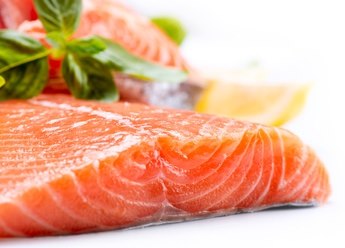
The National Agency for Health Security, Food, Environment and Labour (ANSES) recommends eating fish twice a week (3). Therefore, you can combine a lean fish such as cod or Alaskan hake with a fatty fish such as salmon or sardines.
Science is unanimous. The Omega 3 contained in salmon and all fatty fish improve neuromuscular function and reduce fatigue, which helps to improve sporting performance (4). A sufficient supply of omega 3 increases muscle function by up to 20& nbsp; %. In addition, salmon has a health advantage in preventing cardiovascular disease, brain development and reducing certain diseases. The only drawback is that, due to the risk of contamination by heavy metals, care must be taken with the label and its origin.
| Calories | Protein | Glucids | Lipids | Interest |
|---|---|---|---|---|
| 206 kcal | 20 g | 0 g | 14 g | Omega source 3 Rich in protein Rich in vitamins B Rich in minerals and trace elements |
Food #6: green vegetables, essential for your health
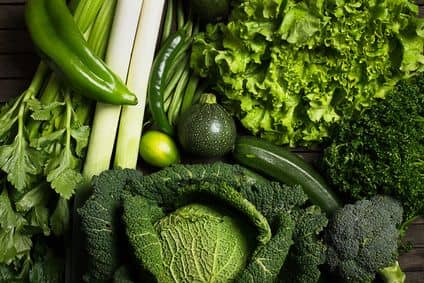
According to researchers at the University of Leuven in Belgium (5), green vegetables, like spinach, are extremely effective in improving sporting performance. 27 athletes took part in the experiment under "normal" conditions and then under hypoxic conditions, i.e. oxygen-depleted as in the case of altitude athletes. After 5 weeks of testing, the composition of the muscle fibres had changed positively. The researchers explain these results by the presence of nitrates in this type of food. They allowed vasodilation and better irrigation for easier oxygen transport.
Integrating green vegetables is therefore beneficial for the performance of any athlete and especially for endurance athletes at altitude.
| Calories | Protein | Glucids | Lipids | Interest |
|---|---|---|---|---|
| 23 kcal | 2.2 g | 3 g | 0.2 g | Iron-rich Protects against oxidative stress Prevents certain cancers Rich in vitamins and minerals |
Food #7: bananas to boost your performance
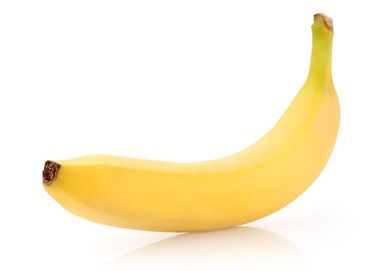
Bananas can be taken everywhere and consumed in no time at all, making them one of the sportsmen's favourites. Easy to eat, it is useful to boost, provide quality carbohydrates before exercise or prepare for recovery in post-training.
Rich in potassium, bananas are useful for muscle recovery and cramp reduction. As you may have noticed, bananas are omnipresent in the supplies or at the finish of a run. To carry your banana everywhere, without it crashing, we advise you to choose a "banana case" (yes, it does exist). In addition to creating a sensation among your classmates, you can eat it anywhere, before, during or after your sporting event. Finally, be aware that the more ripe the banana is, the more its glycemic index increases.
| Calories | Protein | Glucids | Lipids | Interest |
|---|---|---|---|---|
| 90 kcal | 1.5 g | 20 g | 0 g | High potassium content Favors intestinal transit Source of vitamins B6 and B9 IG moderate (52) |
Food #8: almonds, ideal as a snack
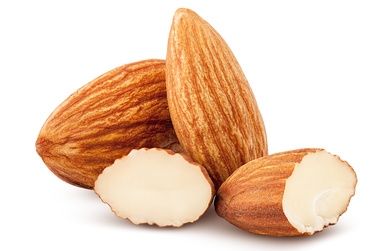
Once again, a scientific reference (6), almonds boost sporting performance. A study published in the Journal of the International Society of Sports Nutrition informs us that athletes who consumed 75 g almonds for 4 weeks saw their performance increase in cycling during a endurance effort. Among them were 8 cyclists and 2 triathletes. The study points out that a handful of almonds as a snack is particularly suitable for athletes to provide the nutrients they need.
Generally, it is recommended to consume 1 g of fat per kilo of body weight. To meet its needs, oilseeds are all available, especially as snacks.
| Calories | Protein | Glucids | Lipids | Interest |
|---|---|---|---|---|
| 578 kcal | 19 g | 4 g | 54 g | Rich in magnesium and vitamin E Prevents heart disease Insulin sensitivity Contains \"good\" lipids |
Food #9: raisins, to take everywhere
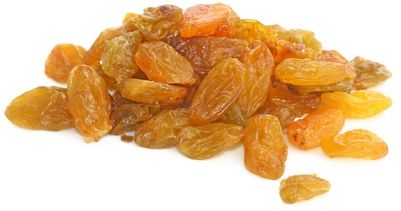
Raisins provide energy to the athlete with these 75 g carbohydrates per 100 g. American researchers (7) tested 11 male riders, divided into three control groups. Eating raisins improves sports performance by providing carbohydrates.
Very popular with sports enthusiasts, dried fruits are popular to give a boost. Do not hesitate to vary the pleasures according to your desires.
| Calories | Protein | Glucids | Lipids | Interest |
|---|---|---|---|---|
| 324 kcal | 3 g | 75 g | 1.3 g | Antioxidant Vitamin B source Energy supplier To take everywhere |
Food #10: dark chocolate to indulge yourself without (too much) feeling guilty
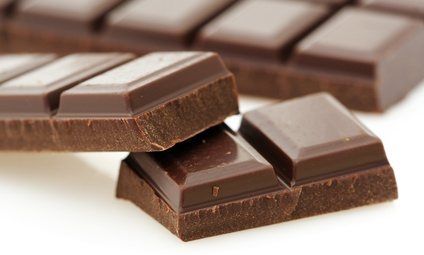
Our latest food to boost your performance and taste buds is of course dark chocolate.
Good for morale, dark chocolate acts as an anti-stress. Source of magnesium, it could have a beneficial effect on cramps while theobromine significantly stimulates the nervous system. It is also very rich in antioxidants and thus helps to fight against free radicals.
Of course, with 633 kcal per 100 g, it is advisable to be reasonable... ;-)
| Calories | Protein | Glucids | Lipids | Interest |
|---|---|---|---|---|
| 633 kcal | 6.3 g | 36.6 g | 51.2 g | Vitamin and mineral content Good for c |
Conclusion
In conclusion, there are many foods available to improve performance. Among them:
- Rice
- Oatmeal flakes
- Eggs
- Chicken
- Fish
- Green vegetables
- Bananas
- Almonds
- Raisins
- Dark chocolate
Each of them provides micronutrients as well as macronutrients useful for amateur and professional athletes. Nevertheless, our article would not be complete without reminding us the importance of hydration in sports performance. Since water represents 60 % to 70 % of our body weight, it is important to remember that even minor dehydration in the order of 2 % leads to a 20 % decrease in sporting performance. Now it's up to you to stay hydrated and eat better to maintain your health, enjoy your sport and why not set new records.
These articles may also interest you
Hydration and athletic performance!
Sport and nutrition: 7 tips to optimize your performance
Alimentation du sportif : quels glucides faut-il consommer ?
Photo credit: Fotolia.com

